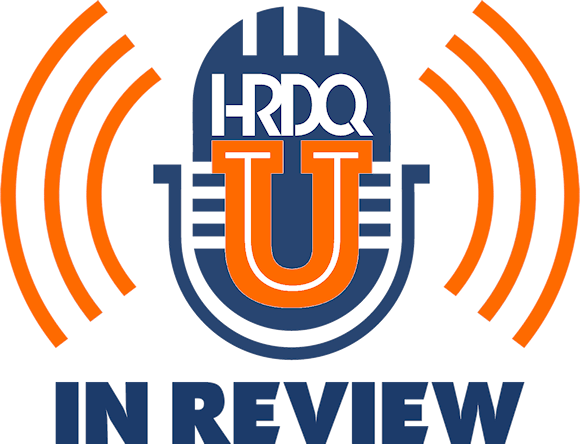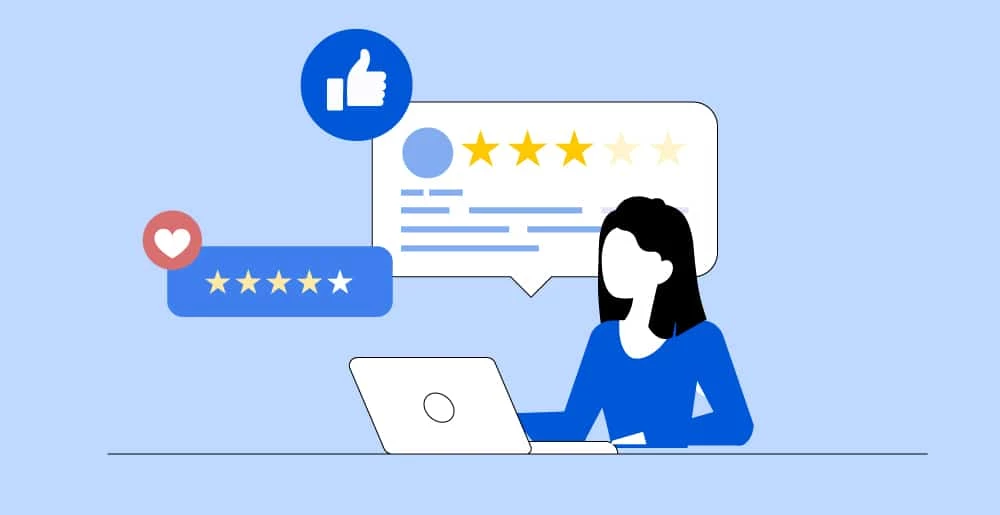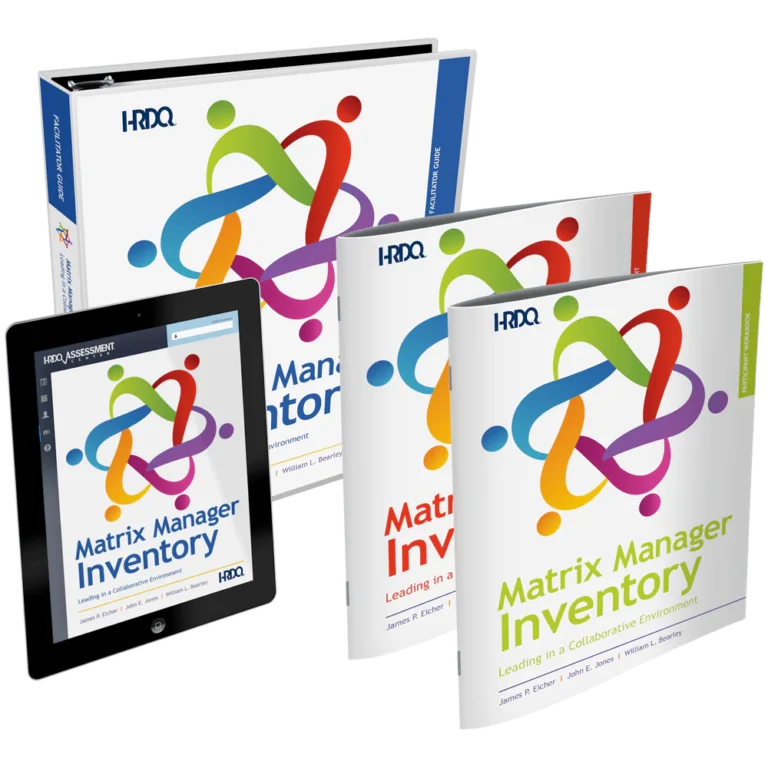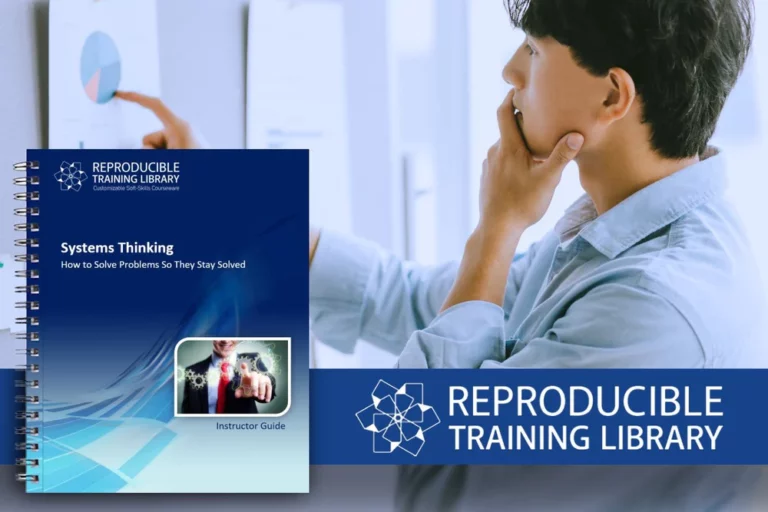

I’m joined by Lenn Millbower to dive into a unique approach to organizational success – The Santa System! Lenn, an experienced learning and development (L&D) expert, brings a fresh perspective using the North Pole as a model for effective leadership and teamwork. We’ll discuss the biggest changes happening in the learning and development space, key takeaways from our recent webinar, and how the principles of Santa’s workshop can help organizations thrive, especially during high-pressure seasons. Lenn shares insights on overlooked traits that can transform team dynamics and tips to help leaders boost motivation and productivity in their teams.
Tune in to learn more about
Whether you’re in leadership or simply want to improve your team’s success, this episode is full of actionable advice.
00:02
Welcome to this week’s episode of the HRDQ-U In Review podcast where we bring the latest insights and practical tools for enhancing soft skills training in your organization. This podcast is brought to you by HRDQ.com and I’m your host, Sarah, Learning Events Manager at HRDQU. Today I have Lenn Millbower joining me to discuss the webinar, The Santa System: North Pole Strategies for Organizational Success. Thanks so much for joining me today, Lenn.
00:29
Hey, glad to be here. We have such a good time when we’re together. It’s fun. We do. And Lenn, you’ve joined me on the podcast a couple of times before, correct? Yes. Yes. We’ve done this at least once. I think perhaps maybe twice. Yeah. Well, welcome back. I think I was looking back in my notes. You were one of the first podcast guests that I’ve had over here as well. So thanks for coming back. So so to speak, we’re trailblazers, huh?
00:57
Pretty much. So, Lenn, can you share a little bit about what you do, who you are, how you got to where you’re at today? Sure. Well, I’m entering the ranks of the old, so I’ve got a very long bio, but very quickly, I was a childhood entertainer. I spent 10 years on the road as a professional magician, musician, got a degree in music composition and a master’s in training and development.
01:27
Disney worked at Walt Disney World for 25 years and to my amazement found out I was a trainer, wrote a lot of the training out there, which is really interesting because I was making people smile every day but I never saw the smiles, if that makes any sense to you. I was setting up the people who do the actual work. And then I started thinking about how to apply entertainment and music to training and next thing you know I had this business where
01:57
people wanted to hear what I had to say. Started out with offbeat training, went into discussing Disney once I left the mouse. And my latest thing I’m working on is a book that just published. It’s really interesting. It’s called The Santa System, 10 leader lessons from the North Pole. And what I did was I spent a lot of time thinking about if Santa Claus were real, how would he actually
02:27
run the North Pole and the book offers lessons for anyone out there on being more effective as a person and as a communicator, as a leader based on what Santa Claus would do. Yeah, it was a really exciting book and really fun. It takes, you know, serious topics and makes it fun, makes the learning fun on how to improve. So Lenn.
02:54
Um, can you talk a little bit about, know, what do you see happening in the learning and development space right now? Yeah. Um, I, I know you were going to ask this because you shared that question and candidly, I can’t tell you what’s going on out there. I can tell you what’s going on in here, meaning with me. And it’s because of a peculiarity of mine is I try not to listen too much to anyone else, particularly when I’m writing a book.
03:24
because I want it to be my thoughts, not someone else’s. So from my perspective, what I’ve noticed, and I have no statistical data to back this, what I’ve noticed is that people are so distracted and so unable to focus for long periods of time. Like as a, for instance, I’m lucky if I get through a 20 minute TV show now, let alone a two hour movie, that I believe that
03:52
we need to be more engaging, more entertaining, if you will, which plays right into my strengths. So obviously I would think that where somebody that didn’t have those strengths might not think so. again, going back to that Santa thing, the idea of just talking leadership lessons is kind of boring. But if you can wrap them in an entertaining package, maybe you’ve got more chance for people to listen.
04:19
In my learner attainment work, which is what I ultimately called the fusion of entertainment and training together into learner attainment, I always say keep them awake so the learning can take. And I think we’re going more and more in that direction combined with one other thing. Now, I don’t know if this will be true over the long term, but the 2024 election just happened and it strikes me that
04:48
people are seeking, if you will, comfort food, meaning some maybe back a little bit to tradition, but not stodgy traditional. I think it’s about engagement and keeping them focused via being entertaining and engaging so that you can get a message to them.
05:13
So that’s what I think is going on and I’m perfectly willing to have an expert tell me I’m wrong. It’s just my own perspective. Thanks for sharing that. And so Lenn, we did this webinar just this week on the Santa system at North Pole strategies for organizational success. Can you share what the key takeaways were for our registrants at this event?
05:37
Sure, we actually we focused on five areas that Santa showed me. They are purpose, priorities, people, platform and process. And we could take hours talking about this, but that would that would negate everything I just said. So let me see what I can do very quickly. Purpose is the reason you exist. It’s not your vision and your mission. It is your grand focus.
06:03
So for instance, for Santa, his purpose is to deliver joy to the world. Priorities are the order in which you make decisions. As Santa says, and I’ve got his quote here, let me pull it up. If Santa must make every decision, no presents get delivered. So what Santa did was he set up a bunch of priorities for people to make their own, or elves in this case, to make their own decisions.
06:33
an organization that I worked for, Disney, that did that, did that very well, and they called them their keys, keys to the kingdom, and they were safety, courtesy, show, and efficiency in that prioritized order. So Santa’s acronym is SMILE, and of course, I don’t remember it off the top of my head. I’ll see if I can pull it up here. But the idea is if you set,
07:03
things up so that everybody knows what the priorities are. They can make decisions. They don’t have to go to a manager. They don’t have to be running and then a manager doesn’t have to be running from place to place trying to figure things out because the frontline folks can make the decisions on their own based on the template. So actually I just pull it up. Smile at the North Pole is what I’m about to do safe. Is it magical? Is it inclusive? Is it loving? And is it efficient?
07:33
And if you know it’s those things, you know you can go ahead and make your decision because you can help people smile. And it’s not just for frontline people. Any decision at any level of the organization can be made with priorities. A people is how you treat your people. The leaders at the North Pole, they’re called the Chief Territory Officers, and they’re actually the Santas. Because one Santa Claus cannot deliver the entire world in one night. So Santa…
08:02
has created these Chief Territory Officers. There’s over 20 of them. together they all handle the world. And the poll priority or poll expectations are what the leaders are expected to do. Positivity, ownership, logistics, and expertise. So that is how you treat people, and particularly treating your own people the best you can so that they
08:31
are encouraged to treat the customers, the guests, the clients, whatever you want to call them, the best you can. Platform is the stage on which you do your performance. very often, companies say wonderful things and they forget to really live what they’re saying. The most egregious example I can remember is when United had the slogan, fly the friendly skies, and then there was video of them dragging a guy off a plane.
09:00
not very friendly. But your image, what you say about your company, your purpose statement, the look of your location and your processes should all align to deliver a seamless experience. I’ll give you an example from a restaurant. You go and sit down in a restaurant and the first thing the server says is, I hope you’ve got a lot of time.
09:29
The chef called in, the manager’s cooking, good luck. That kind of destroys the whole experience and that is ruining your show platform. So it’s purpose, priorities, people, platform and process. Process is the killer of any organization. A bad process undercuts anything you say you are. An example is that process of dragging the guy off the plane. Clearly there needed to be a better process than that.
09:59
But leadership hadn’t figured that out. So that’s what the Santa system is about. And Santa took me to various locations where they could demonstrate how all five of those components worked to deliver a seamless, joyful experience for children everywhere. And Lenn, the concept of the Santa system is such a creative analogy. Can you share?
10:27
What inspired the idea of this book? I’ve been thinking about it for a very long time. actually I just wondered if the North Pole, it’s you know, creative people come up with oddball connections. That’s what makes somebody creative. They take two things that you don’t think would go together and put them together and turn them into something else. And so I’m highly creative.
10:56
So it causes me trouble in life because people say something like if they make a statement, I can think of three different things that statement might mean. And I’m very confused. But I was curious as to how such an organization could work. And I figured out a little bit of it. But what always hung me up was how do I answer the unanswerables? Like, how does Santa get down the chimney?
11:23
And finally, one day I realized all I had to do was have Santa reply to me when I asked a question I couldn’t figure out the answer to. Oh, that’s proprietary. And once I realized I didn’t have to answer any question, every question, I went ahead and it was just a fun, creative exercise. How would Santa do the roof runs, you know, the annual Christmas Eve delivery of presents? Could one Santa actually do it?
11:52
What about the else or are the else small and pointy ears and? How how would Santa handle all these department store Santa’s and and how the toys aren’t made at the North Pole anymore So how would Santa do that and I just started asking these questions and before you knew it I was into a major project because the answers were so fascinating yeah, and
12:17
In the webinar, you discuss the key traits or systems that make Santa’s workshop so successful. Which one do you think organizations overlook the most and how can they start to implement that?
12:33
Um, I, I’m not sure I heard the question correctly. Uh, are you asking which of the things in the book, the, the organization or an organization should focus on? Yeah. So with the, the, the key traits or the systems that, make up, make Santa’s workshops so successful, what do you think? Um, you know, bringing that into organizations.
13:01
a big major pain point is within organizations. I think a major point is it’s a formula. In terms not Santa, I’ll do that first. A great leader creates a great employee experience. A great satisfied employee creates a great customer experience. Satisfied customers come back.
13:29
become loyal, spend more money, become advocates, business profits result. That’s the formula. In Santa’s case, it is about creating joy. So a great leader creates happy elves. No, they’re not actually creating them out of whole cloth. mean, your behaviors towards your employees make them happy. And happy elves create happy toys. Happy toys make
13:58
children happy, happy children make parents happy, and happy parents make the world a more happy place. And that’s why Santa’s purpose is delivering joy. We create joy. In fact, it’s interesting. There’s an old song from my musician days many years ago called Joy to the World. It was by a group called Three Dog Night. And it’s a Hoyt Axton song. And I actually heard the elf singing it, Joy to the World.
14:28
all the boys and girls, joy to you and me, joy to the family. And Santa and his team go to great Lenngths to make sure the elves are happy. And it’s a tricky thing in that organization because elves seem to live forever. you may imagine being stuck, so to speak, with every employee you’ve got forever more.
14:56
and not much in the way of promotions happening anywhere. It could be a miserable situation. for the North Pole, and of course, you know, this is all fictional, but it demonstrates a point superbly. So for the North Pole, the important thing is to keep the elves motivated and satisfied so that happy toys result in creating a happier world.
15:25
And so teamwork and leadership are crucial in any organization, much like in Santa’s workshop. What lessons from the North Pole’s leadership approach can managers and leaders take into their own teams? Well, there are, there are 10 lessons in the, uh, in the book. Each chapter has a lesson.
15:49
Talking all ten would probably take too long, but let me give you a couple examples. Lesson one is be your best, share the rest. Nobody does it alone, and Santa certainly doesn’t. He relies on others. And with each of these lessons, I offer a real world example from my own experience doing cultural makeovers for organizations. Lesson two is engage emotion, deliver devotion, and that talks about how if you…
16:17
get the ELFs engaged, they become fully committed to you. And then let’s talk about Leader Lesson 3 and really go in there. Set guidelines, not decisions. Leader Lesson 4 is be approached, not avoided. Now, the guidelines is the priorities and Leader Lesson 4, be approached, not avoided. There is something I’d like to talk about in this leadership approach that
16:47
is good anywhere in the world at any position, even if you’re just, even if you’re frontline. There are four different kinds of learners and as the book explains and they are the buddy, the boss, the grunt and the guide. The buddy is the person who tries to be everybody’s best friend. That can be disastrous in a leader because they’re
17:15
tend to not want to make decisions and they tend to avoid difficult conversations and they tend to give the people such free reigns that everybody’s off charge and doing their own thing and it creates bad situations. The boss is one that leaders leave and that’s one that’s dictatorial. It’s my way or the highway. I really don’t care what you think. We’re doing it my way. So you got the buddy, the boss.
17:42
The grunt is, and you see this all the time in organizations, is the person who’s promoted one step beyond where they really belong and they’re still doing the job they were promoted from. So that’s very frustrating for the people that work for them because they can’t do the job because the boss is always sticking their nose in. So you got the buddy, the boss, the grunt, and then the guide is someone who paints the big picture via purpose and priorities.
18:11
charts that course and then gets out of the way and lets others steer the ship and only comes in to be a cheerleader or a coach or a mentor or a guide to make better things happen. Okay, so if you’re not a leader, if you’re a frontline person, of course it’s useful to be a buddy but not too close. You don’t wanna be bossing people around because that…
18:38
strategy never really works unless it’s an emergency situation. You do want to be a grunt in that position, but not interfering with what others are doing, not trying to take over everything at your level. But you don’t have to have a leadership position to be a guide to success in a better world. So if there was one thing I’d want leaders to take away is
19:07
Don’t be a buddy, don’t be a boss, don’t be a grunt, be a guide.
19:12
And how can the principles of the Santa system help teams stay productive and motivated during high pressure times like, you know, the holiday season that puts a lot of added stress on businesses? Well, there, there are lots of answers to that in the book. Um, the key point though is to be at the top of your game, um, to, to be in a place you enjoy now.
19:41
Now, again, according to the book, the elves don’t leave because if they leave, they lose their longevity meaning, and I don’t mean work longevity, I mean health and growth and, you know, they start to age and so they stick around. But in a normal world situation, if you’re not happy, you’re just making everyone else around you miserable. So leave, go find something else. Be who you really are.
20:10
The best book I ever read on this subject is called Soar with Your Strengths. And the idea is you’ve got some things your world-class at. Everybody does. In my case, I hear, oh, you’re so creative. But yet the person who tells me that has just knitted in Afghan. And I’m thinking to myself, how in the world did they do that? To me, that’s creative. So everybody has a world-class taLennt of some sort. And that taLennt is the thing you do.
20:35
and you get lost in time doing it and all of sudden you realize you’ve skipped lunch because you’ve just been so, so engaged and people tell you, that’s amazing, how’d you do that? That’s so wonderful, you you’re really good at that. And those are the things in that book, Soar With Your Strength, that they recommend that you focus on and find others to do the other things for you and try not to get really good at things you’re not good at because you’re just wasting your time.
21:03
Instead get better at the things your world-class at and then then life comes together for you and that’s basically been the story of my life when I stopped trying to be a Renaissance man is when things started to take off in a positive approach and With the with the elves in the story. They’re put in positions where their strengths can soar and It’s that old saying
21:32
find a job you love and you’ll never work again. Well, the leaders create an environment at the poll where the else just love working there. And so they, they deliver their all. And the result is again, going back to that formula, joy to the world for all the boys and girls. Well, Lenn, before we sign off today, can you share where listeners can go to learn more about your work and connect with you? Sure.
22:02
Um, there’s a website, santa-system.com will bring you to the book and the consulting and the presentations I do. santa-system.com. Uh, there is also, and I imagine Sarah, you’ll, you’ll be sharing this on the podcast, but there is a special location you can go to.
22:30
to purchase any of my works at a discount, solely for HRDQ, and rather than give you all that, just look for a QR code or that link. There is one other thing I want to talk about that’s just kind of fun, and that is Rudolph. And Rudolph,
22:57
turns out actually is a name Rudolph. Rudolph’s name is Rudy. Ruby, excuse me. And the reason her name is Ruby is because male reindeer can’t be pulling Santa’s sleigh because they lose their antlers in early, early December. the reindeer are all girls and Ruby wears a bright gem in her nose. So that’s
23:26
where the ruby thing comes from and that’s where the red-nosed reindeer comes from and the song got it all wrong the the reindeer were fighting amongst themselves and Mary Claus, Santa’s wife hired Ruby to come in and straighten the girls out and they called her a a Mary Bright-noser and they gave her a hard time so Ruby set up the reindeer games and they refused to play
23:54
until the other elves showed them what a fun time they were having playing the reindeer games and then all the reindeers joined in. But that’s a little tidbit of the kind of creativity that’s in the book and is also at the same time useful as methodologies for overcoming a team who doesn’t like you being the leader. Thanks for sharing that story. think that was a
24:21
Great little tidbit to share to leave us today. And yes, we will link all of the information below. If you haven’t watched the webinar, I highly recommend you do so that we have a whole catalog and library full of webinars from Lenn over on HRDQ.com that you can check out with more creative ideas like you’ve listened to today. We’ll have the link below so that you can check out the book as well. And with that, Lenn, thank you so much for your time today.
24:46
Well, thank you. And Merry Christmas or if it’s not that time of year, non-Christmas to you listeners and do everything you can to deliver joy to the people around you. And that way Santa will always be in your heart. Yes, it was a great way to kick off this holiday season here on
25:07
November 15th for sure. We hope you enjoy listening to the HRDQ-U In Review podcast available on all major streaming platforms. If you did enjoy today’s episode, make sure to give us a follow and leave us a five-star review. That’s how we’re able to continue to produce this weekly free content for you. Thank you all for tuning into this week’s episode of the HRDQ-U In Review podcast brought to you by HRDQU.com.


Listen to this podcast event at no charge with your
HRDQ-U Free Access Membership
I’m joined by Lenn Millbower to dive into a unique approach to organizational success – The Santa System! Lenn, an experienced learning and development (L&D) expert, brings a fresh perspective using the North Pole as a model for effective leadership and teamwork. We’ll discuss the biggest changes happening in the learning and development space, key takeaways from our recent webinar, and how the principles of Santa’s workshop can help organizations thrive, especially during high-pressure seasons. Lenn shares insights on overlooked traits that can transform team dynamics and tips to help leaders boost motivation and productivity in their teams.
Tune in to learn more about
Whether you’re in leadership or simply want to improve your team’s success, this episode is full of actionable advice.
[ PODCAST PLAYBACK ]
You must be signed-in with your membership account to access this content.
Enjoyed this podcast? Have suggestions on how we can improve? Please take our quick survey and receive a coupon for 15% OFF any of our individual membership plans.

*Instant 15% coupon available upon completion of survey.
Want to learn more? Become an Individual or Corporate member to watch this and hundreds more webinars!
Take a page from Santa’s Workshop and boost organizational effectiveness. Find out how to improve productivity and achieve better results.

Lenn Millbower
Lenn Millbower, the Mouse Man™ and author of Care Like a Mouse, teaches Walt Disney-inspired service, leadership, innovation, training, and success strategies. Everything Disney touched seems magical. It isn’t. It’s a method. Lenn saw that method up close. He spent 25 years at Walt Disney World as an Epcot Operations trainer, Disney-MGM Studios stage manager, Animal Kingdom opening crew, Disney Institute, Disney University, and Walt Disney Entertainment management. Now, he shares methodologies that will help you make your own magic.
Connect with Lenn on Facebook, X, YouTube, and at www.likeamouse.com

Training Tools for Developing Great People Skills
This event is sponsored by HRDQ. For 45 years HRDQ has provided research-based, off-the-shelf soft-skills training resources for classroom, virtual, and online training. From assessments and workshops to experiential hands-on games, HRDQ helps organizations improve performance, increase job satisfaction, and more.

Matrix Manager Inventory
Today’s workplace is more complicated and varied than ever, and learning how to manage in this variable environment is imperative. Improve organizational performance by developing the ability to switch between “command and control” and “influence and collaboration” leadership styles effectively to achieve organizational success.
Buy at HRDQstore.com
Systems Thinking Customizable Courseware
Systems thinking involves a proactive approach to problem-solving, focusing on analyzing the interrelationships between different organizational functions. Learn how to adopt this approach and discover the best solutions to resolve challenges and enhance productivity.
Buy at HRDQstore.com
“The presentation is very relevant both professionally and personally, especially in these times when everyone needs an open heart! Thank you!”
Pearl P.
Regional Manager
Kaiser Permanente

“Today’s presentation was spot on! A great way to explain how to work and train with your staff to meet your goals. Make a process, work the process, if the process doesn’t work, fix it!”
Larry L.
Owner
Lasertronics

“Lenn Millbower is a fabulous presenter! The materials that were presented are unique and thought-provoking!!”
Barbara S.
Executive Administrative Assistant I
UMBC
The HRDQ-U In Review Podcast, brought to you by HRDQU.com, brings you the latest insights and practical tools for enhancing soft-skills training in your organization. As a learning community for trainers, coaches, consultants, managers, and anyone passionate about performance improvement, we interview subject matter experts and thought leaders from recent webinars they presented with us to take a deeper dive into the content they shared and answer all your questions. Join us as we explore new ideas and industry trends, share success stories, and discuss challenges faced by professionals.
The HRDQ-U In Review Podcast is intended for HR and training professionals, organizational development practitioners, and anyone interested in improving workplace performance and productivity.
New episodes of HRDQ-U In Review are released every week.
The length of the episodes varies, but they typically range from 15-30 minutes.
The podcast covers a wide range of topics related to HR and organizational development, including leadership development, team building, communication skills, conflict resolution, employee engagement, and more.
No, HRDQ-U In Review is completely free to listen to.
You can listen to any available HRDQ-U In Review Podcast right on our website at HRDQU.com via our embedded Spotify player on the related webinar page. In addition to our self-hosted option, you can find the HRDQ-U In Review Podcast on many of the popular streaming services, which are listed above.